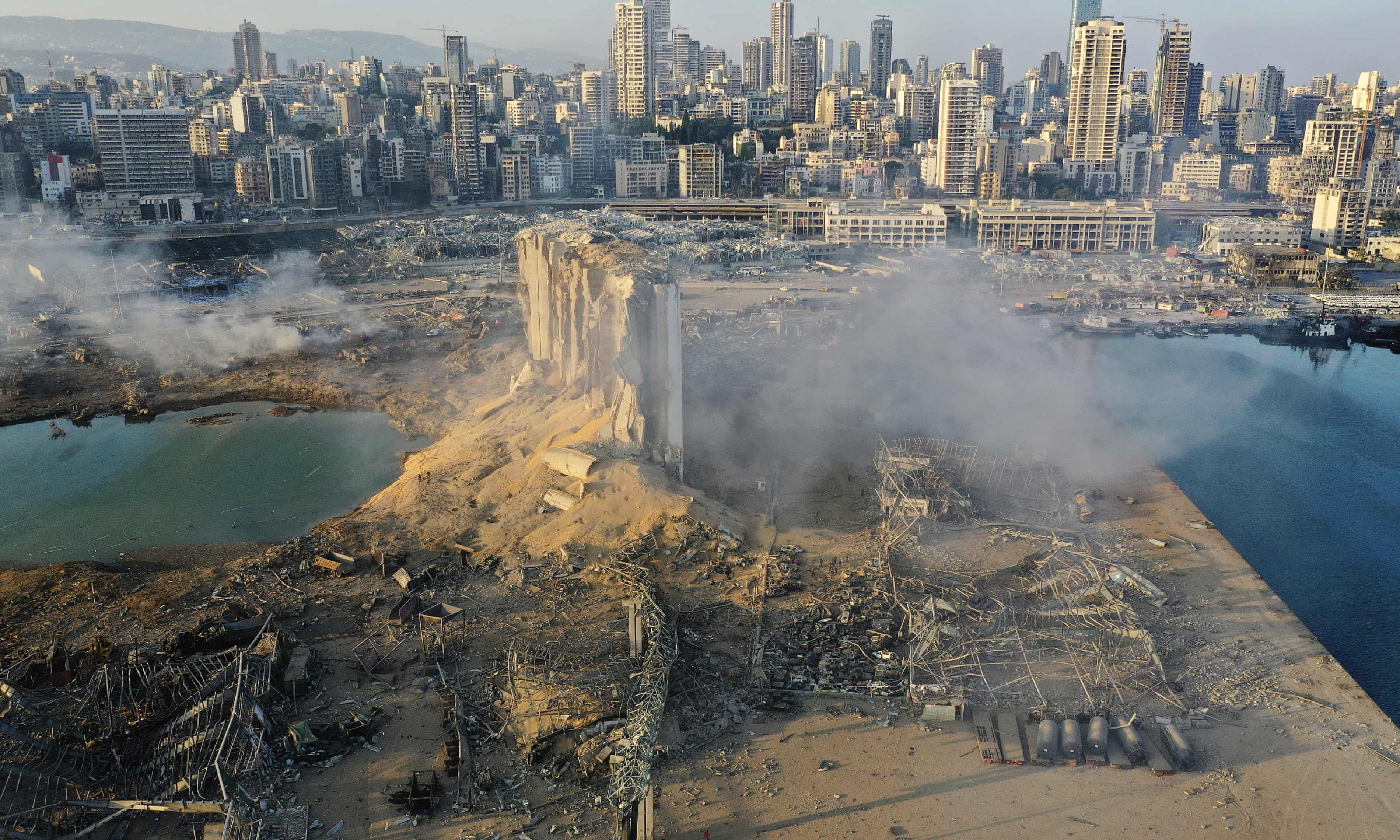Lebanese confront devastation after huge blast kills 100+, damages half Beirut
Residents of Beirut confronted a scene of utter devastation Wednesday, a day after a massive explosion at the port rippled across the Lebanese capital, killing at least 100 people, wounding thousands and leaving entire city blocks blanketed with glass and rubble.Lebanese blame Beirut explosion on years of government corruption
Smoke still rose from the port, where a towering building of silos was half destroyed, spilling out grain. Hangars around it were completely toppled. The blast knocked out a crater some 200 meters (yards) across that filled with seawater — it was as if the sea had taken a bite out of the port, swallowing buildings with it.
Much of downtown was littered with damaged vehicles and debris that had rained down from the shattered facades of buildings.
An official with the Lebanese Red Cross said at least 100 people were killed and more than 4,000 were wounded. George Kettaneh said the toll could rise further.
The blast has left 300,000 people homeless and caused damage across half of the city estimated to cost more than $3 billion, Beirut’s governor said. “I think there are between 250,000 and 300,000 people who are now without homes,” says Marwan Aboud.
The blast appeared to have been triggered by a fire that touched off a cargo of ammonium nitrate that had been stored at the port for years, though it was unclear what sparked the fire. Hitting with the force of an earthquake, it was the most powerful explosion ever seen in the city, which was split in half by the 1975-1990 civil war and has endured conflicts with neighboring Israel and periodic bombings and terror attacks.
Scores of people were missing, with relatives pleading on social media for help locating loved ones. An Instagram page called “Locating Victims Beirut” sprang up with photos of missing, and radio presenters read names of missing or wounded people throughout the night. Many residents moved in with friends or relatives after their apartments were damaged and treated their own injuries because hospitals were overwhelmed.
In Lebanon, citizens are accustomed to fury at the government, with the crumbling economy, hours-long electricity cuts, and an armed group dominating much of the country’s politics.Seth Frantzman: Israeli aid should be on the ground in Lebanon, regional policies prevent it
But the shock and horror following Tuesday night’s explosion at the Beirut port, which has claimed over 100 lives so far and left thousands wounded, marked a new low for an already demoralized public. In the midst of one of the worst crises in Lebanon’s history, the catastrophe marked what many called a new, painful nadir.
Though the source of the blast remains unconfirmed, most of the evidence so far points to government negligence, and many Lebanese seem to agree. The official government account indicates that 2,750 metric tons (about 3,000 tons) of highly explosive ammonium nitrate ignited Tuesday night, according to Lebanese Public Security Director Abbas Ibrahim. The explosive material had been idling in the harbor since 2013.
An investigation by Al-Jazeera found repeated letters from Customs Director Badri Daher asking for the cache of ammonium nitrate to be removed. No action was ever taken by authorities.
“We knew they were there,” said Beirut customs official Hasam Quraytam, referring to the tons of ammonium nitrate, “We just didn’t know it’d be this dangerous.”
The Higher Defense Council, which has called a two-week state of emergency, has announced that it is launching an investigation. The results will be announced in five days, the HDC said in a statement.
Lebanese President Michel Aoun stumbled through a speech at a Lebanese cabinet meeting on Wednesday, barely raising his eyes from his screen as he promised that the government would uncover the truth behind the explosion and punish those responsible “with the full measure of the law.”
Within hours of the explosion that tore apart Beirut, killing a hundred and injuring 4,000, Israel was prepared to support its victimized neighbor in its time of need. Lebanon and Israel are not just neighbors; the countries share many commonalities.
The architecture and design of their port cities are rooted in the 1940s and 1950s. The coastline is the same.
The people of Beirut, like Israel’s Tel Aviv, are open-minded and progressive. But the policies of the Lebanese government appear to have prevented immediate aid or support from reaching the tragedy-stricken country.
Israel has extensive experience in search and rescue as well as disaster relief. The Jewish state has pioneered the use of technology to aid in disasters as well, part of the overall technological innovations in the Home Front command.
These technologies and abilities have been learned from Israel’s experience assisting Haiti in the 2010 earthquake and also in Japan in 2012 after a 15-meter tsunami disabled the Fukushima Daicchi reactors. Israel has also sent aid to Nepal, the Philippines and Mexico during disasters there.
In interviews I conducted in recent years, the Home Front Command described its new technological innovations to help map and locate survivors after a disaster.
Israel has already been recognized for offering support to Lebanon. But Lebanon’s authorities have been slow to respond.
This is despite the fact that Israel’s hospitals in the North are a short trip from Beirut. They have experience working with wounded people from Syria.




























